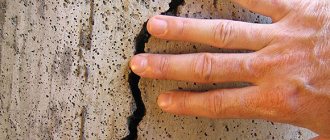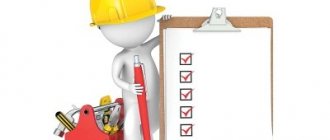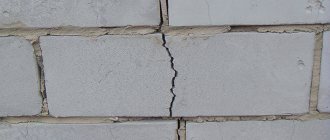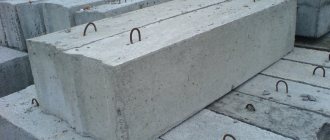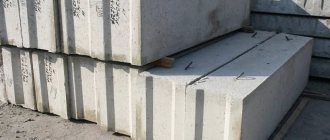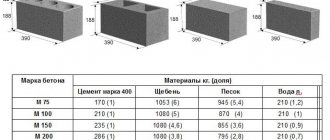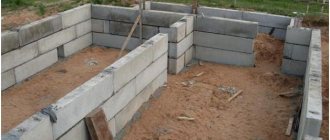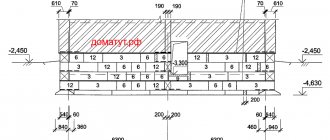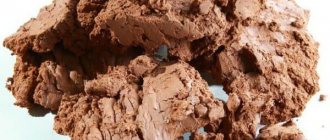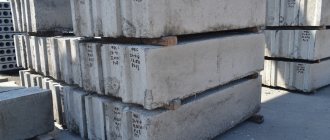Features and types of foundation blocks
The block is made as follows: M100 or 200 concrete is poured into the mold, and reinforcement is placed (not always). Modifiers are added to the solution to enhance certain properties - water resistance, frost resistance, etc. Next, the mixture is compacted with a vibropress and steamed in a special chamber.
The resulting products differ from each other in weight and overall characteristics. There are three main types:
- FBS is a solid foundation block, i.e. full-bodied. The shape is similar to a brick with grooves that provide a monolithic connection of the elements to each other. The concrete is not reinforced;
- FBV – with cutouts for communications;
- FBP – partially hollow.
The weight of the FBS block is greater than that of other types. Accordingly, the load-bearing capacity is higher. The products are equipped with metal loops for carrying.
GOST for manufacturing – 13579-78. Main technical characteristics of concrete:
- density – minimum 1800 kilograms per cubic meter;
- strength class - minimum B 7.5.
FBS equipped with cargo loops
Advantages and limitations of use
A block foundation is a prefabricated analogue of a monolithic one. Any foundation, with the exception of a pile foundation, can either be filled completely or made up of separate fragments. Advantages of a block base:
- high speed of construction - no need to wait for the concrete to mature at each stage;
- efficiency. Savings are achieved not only due to the absence of auxiliary materials (formwork, etc.), but also due to the FB themselves: if design calculations allow, the slab foundation can be made not continuous, but individual elements can be laid with a certain step.
The bearing capacity of such a foundation is high, but it is not stable enough on poor soil - heaving, subject to horizontal and vertical movements. If the monolithic tape is plastic and compensates well for shrinkage, then the prefabricated tape under the same conditions can crack at the seams. In wetlands and peatlands, preference is generally given to piles.
The disadvantages also include the large weight of the foundation blocks. For example, FBS 24 4 6 weighs 1.3 tons. Installation cannot be done without heavy equipment. For private suburban development they choose the so-called. hand-molded products, FBS 2-2-4 - their weight is about 30 kilograms, and their volume is equal to seven bricks. This material can be handled manually.
Prefabricated block tape
FBS 24.4.6-T
Solid reinforced concrete foundation blocks FBS 24.4.6-T made of heavy concrete for walls and basements are widely used in the construction of columnar and strip foundations. Concrete blocks are laid along the perimeter and center lines of the structure being designed, and the joint between them is filled with a special solution that ensures the strength of the connection. A foundation made of prefabricated concrete blocks takes the loads that are transmitted from the weight and walls of the building and distributes them further into the ground.In addition, with the help of foundation blocks, walls of basement or basement rooms of various depths, as well as technical undergrounds of buildings, are built. The main area where prefabricated block foundations are used is industrial construction. However, the light weight of the blocks allows them to be used in private construction: without the need to involve heavy equipment, you can quickly build a strip foundation of any size and configuration. Products solid foundation blocks FBS 24.4.6-T made of heavy concrete for walls and basements, being universal reinforced concrete products, are also used in road construction, where they act as barriers and low fences on the roadways, as well as in places not intended for the passage of vehicles.
Prefabricated foundation blocks solid FBS 24.4.6-T made of heavy concrete for concrete walls and basements have sufficient strength for installation in any type of soil and in any climatic conditions. The required level of moisture resistance and frost resistance is achieved by adding special chemical additives, which are added to the concrete mixture during the production of products and the joint between blocks when they are installed on a construction site. Solid foundation blocks FBS 24.4.6-T made of heavy concrete for walls and basements have the most important advantage compared to monolithic foundations: the cost of individual blocks and their installation are much cheaper, and the ease of installation and the ability to carry it out at any time of the year saves time , spent on the construction of structures. In addition, if the product breaks down, there is no need to completely repair the foundation; it is enough to just replace the damaged element.
Products foundation blocks solid FBS 24.4.6-T made of heavy concrete for walls and basements is a rectangular parallelepiped, the side faces of which have special grooves designed for joining the blocks with each other. The grooves are filled with a special cement mortar, which provides the necessary strength of the connection and protection from the negative influence of the environment. On the upper plane, the foundation blocks have lifting loops for ease of installation. When using special gripping devices for lifting and installing blocks, it is allowed to produce blocks without lifting loops.
Solid reinforced concrete foundation blocks FBS 24.4.6-T made of heavy concrete for walls and basements are manufactured in accordance with the standards and instructions given in GOST 13579-78 “Concrete blocks for basement walls” from heavy, light or silicate concrete. The class of concrete in terms of compressive strength is taken to be no less than B3.5 and no more than B15, respectively, for blocks made of light and heavy concrete, and B12.5 for blocks of dense silicate concrete. Classes for frost resistance and water resistance of concrete are assigned individually for each project, depending on the operating mode of the structures and climatic conditions in the construction area.
Reinforced concrete products solid foundation blocks FBS 24.4.6-T made of heavy concrete for walls and basements, as a rule, are not reinforced, however in some cases the blocks may have reinforcement outlets to enhance the strength of the foundation: the blocks are rigidly connected to each other and combined into a single frame structure . Lifting loops, with the help of which foundation blocks are transported and mounted, are made of steel rod hot-rolled smooth reinforcement of class A-I or from steel of periodic profile Ac-II.
Solid reinforced concrete foundation blocks FBS 24.4.6-T made of heavy concrete for walls and basements are supporting structures that can withstand significant forces. The reliability and durability of buildings depends on the quality of their manufacture. Therefore, quite serious requirements are imposed on the products: foundation blocks are subjected to control tests at each stage of production in order to prevent defects, which can lead not only to subsidence and collapse of the structure, but also to a threat to human life.
These products, solid foundation blocks FBS 24.4.6-T made of heavy concrete for walls and basements, are subject to mandatory testing for concrete strength at the time of release from the factory. The value of the actual tempering strength of concrete products is accepted: 50% of the compressive strength class - for heavy and light concrete of class B12.5 and higher; 70% – for heavy concrete class B10 and below; 80% – for lightweight concrete class B10 and below; 100% – for dense silicate concrete. Delivery of reinforced concrete blocks with a concrete tempering strength lower than the strength corresponding to its compressive strength class is permitted only if the manufacturer guarantees that the concrete will achieve the required strength at its design age.
Solid foundation blocks FBS 24.4.6-T made of heavy concrete for walls and basements do not allow cracks, except for local surface shrinkage cracks, the width of which should not exceed 0.1-0.2 mm. Minor deviations in design dimensions are allowed, the values of which should not exceed 1±3 mm for the length of the products, ±8 mm for the width and height, ±5 mm for the dimensions of the groove cutouts. The deviation from the straightness of the profile of the block surfaces should not exceed 3 mm along the entire length and width of the block. Mounting loops must be cleared of concrete deposits.
Solid reinforced concrete foundation blocks FBS 24.4.6-T made of heavy concrete for walls and basements are stored in stacks, sorted by brand and batch and laid close to each other. The height of the stack is assumed to be no more than 2.5 m. During storage and transportation, each block is placed on spacers, which should be positioned vertically one above the other between the rows of blocks. The pads under the bottom row should be laid on a dense, carefully leveled base. The thickness of gaskets and linings must be at least 30 mm.
Solid foundation blocks FBS 24.4.6-T made of heavy concrete for walls and basements must be securely fastened during transportation to prevent displacement. The height of the stack when transporting products is determined depending on the carrying capacity of vehicles and the permissible loading dimensions. Loading, transportation, unloading and storage of blocks should be carried out in compliance with measures to prevent the possibility of damage.
You can not only order solid reinforced concrete foundation blocks FBS 24.4.6-T made of heavy concrete for walls and basements, but also consult with our specialists and select the required designs of reinforced concrete products. In our sales department you can find out and clarify the price of reinforced concrete foundation blocks in advance and calculate the total cost of the order. You can buy reinforced concrete products, solid foundation blocks FBS 24.4.6-T made of heavy concrete for walls and basements and consult on general issues of purchase and delivery by calling: St. Petersburg: (812) 309-22-09 , Moscow , Krasnodar . Company operating hours: Mon-Fri from 9-00 to 18-00. delivers reinforced concrete foundation blocks throughout Russia directly to the customer’s site or to the construction site, if infrastructure allows.
For questions regarding the installation of reinforced concrete foundation blocks, please contact us by phone.
How the marking is deciphered
The name of the product contains all the information about it, with the exception of weight. For example, FBS 24 6 6T stands for:
- FBS (or V, or P) – block type;
- 24 – length (rounded);
- 6 – width;
- 6 – height;
- T – type of concrete (heavy).
In addition to T, there may be a P at the end - porous, i.e. expanded clay concrete, or C - silicate. The choice of the latter is determined by the chemical characteristics of the soil (water content, acidity, etc.)
The weight of a heavy concrete foundation block and its load-bearing capacity are higher than others.
| FBS | length | height | width | weight | volume |
| 24-3-6 | 23,80 | 5,80 | 3,00 | 970 | 0,414 |
| 24-4-6 | 23,80 | 5,80 | 4,00 | 1300 | 0,552 |
| 24-5-6 | 23,80 | 5,80 | 5,00 | 1630 | 0,690 |
| 24-6-6 | 23,80 | 5,80 | 6,00 | 1960 | 0,828 |
| 12-3-6 | 11,80 | 5,80 | 3,00 | 470 | 0,198 |
| 12-4-6 | 11,80 | 5,80 | 4,00 | 640 | 0,265 |
| 12-5-6 | 11,80 | 5,80 | 5,00 | 790 | 0,331 |
| 12-6-6 | 11,80 | 5,80 | 6,00 | 960 | 0,398 |
| 12-4-3 | 11,80 | 2,80 | 4,00 | 310 | 0,127 |
| 12-5-3 | 11,80 | 2,80 | 5,00 | 380 | 0,159 |
| 12-6-3 | 11,80 | 2,80 | 6,00 | 460 | 0,191 |
| 9-3-6 | 8,80 | 5,80 | 3,00 | 350 | 0,146 |
| 9-4-6 | 8,80 | 5,80 | 4,00 | 470 | 0,195 |
| 9-5-6 | 8,80 | 5,80 | 5,00 | 590 | 0,244 |
| 9-6-6 | 8,80 | 5,80 | 6,00 | 700 | 0,293 |
Weight and overall characteristics of FBS foundation blocks
Types and markings
Reinforced concrete products are manufactured in accordance with GOST 13579-78. They are:
- FBS - solid;
- FBP - hollow;
- FBV - solid with a cutout (designed for passing communications under the ceiling and laying jumpers).
Table 1 - Main dimensions of foundation blocks
| Block type | Length, mm | Width, mm | Height, mm |
| FBS | 2380 | 300; 400; 500; 600 | 580 |
| 1180 | 400; 500; 600 | 280; 580 | |
| 880 | 300; 400; 500; 600 | 580 | |
| FBV | 880 | 400; 500; 600 | 580 |
| FBP | 2380 | 400; 500; 600 | 580 |
Figure 3 — Structure of block marking symbols
Using an example, consider a block marked FBS-12-Z-6t. When marking, decimeters are used, so the decoding of the marking sounds like this: FBS is a solid block, 1180 mm long, 300 mm wide, 600 mm high, made of heavy concrete.
The letter designations at the end of the brand are deciphered:
- t - heavy concrete;
- n - on porous aggregates (expanded clay concrete);
- c - dense silicate.
In addition to markings, stamps of the manufacturer (including quality control department) are indicated on the block. Pay attention to this when purchasing.
Installation features
The base for a block foundation can be of three types:
- flat compacted area, waterproofing installed;
- a well-packed pillow made of ASG, 30 cm minimum. Width – slightly larger than that of blocks;
- PGS pillow 8-10 cm with bitumen coating.
Sectional view of a strip foundation Before laying the blocks, the base surface is filled with concrete or cement-sand mortar. They also fill the seams. The width of the seams is up to 4 cm. After the mortar has hardened on the finished foundation, vertical and horizontal waterproofing is carried out using pasting and coating materials.
